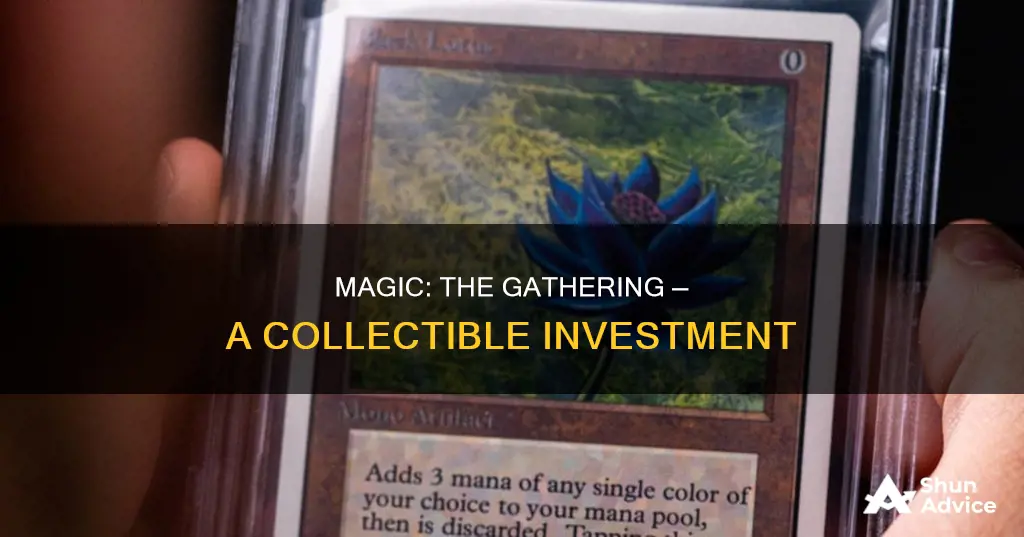
People have been investing in Magic: The Gathering cards since the game was released in 1993. There are many reasons why someone might invest in these cards. Some people are players of the game and are looking to maximise their enjoyment by buying cards to improve their decks. Others are collectors who are passionate about the game and are looking for a hobby that brings them satisfaction. Finally, some people are investors who are looking to make a profit in the long term by speculating on the cards' future value.
What You'll Learn

To play the game
People invest in Magic: The Gathering cards for a variety of reasons, one of the most common being to play the game. Magic is considered one of the greatest games ever created, offering a variety of formats and levels of competition to suit any player and budget.
When investing to play the game, the goal is to maximise enjoyment while minimising expenses. This can be achieved by being strategic about how money is invested, such as by attending pre-release events and drafting frequently when a new set comes out, which allows players to add cards to their collection while also playing the game. Another strategy is to playtest decks/cards before buying them to ensure they work for the player, avoiding the realisation that a strategy or card is terrible after already spending money on it.
Additionally, players can make their money go further by trading or selling cards they are not using. This is especially true for Standard cards, which have a short shelf life. It is recommended to hold onto cards relevant for non-rotating formats like Modern or Commander, so that they don't suddenly rotate and become irrelevant.
For those who are new to the game, it is recommended to buy a Challenger deck or enter Friday Night Magic drafts to quickly determine whether the game is worth investing in.
Retirement Planning: Many Left Behind
You may want to see also

To make a profit
People may invest in Magic: The Gathering cards with the goal of making a profit. The value of the cards is influenced by several factors, including rarity, demand, and condition. Cards that are rare, in high demand, or in good condition tend to command higher prices. Additionally, the player base can directly influence card values, as cards that are popular and widely played often experience increased demand and higher prices.
When investing in Magic: The Gathering cards for profit, it is important to consider both speculation and investment strategies. Speculation involves taking advantage of short-term market shifts and metagame changes to make quick profits, while investment involves holding cards for the long term, typically two to five years or more, to allow their value to increase over time.
To make profitable investments, investors should focus on acquiring cards with long-term value. This includes cards that are likely to be sought after for years to come, rather than just those that are currently popular. Special releases and limited-edition prints can be a good starting point, but researching older vintage cards and understanding long-term demand may pay off even more. Additionally, cards with aesthetic value, such as alternative art or foil prints, often attract collectors and players alike.
It is also crucial to consider supply and demand dynamics when investing in Magic: The Gathering cards. The availability of specific cards can fluctuate due to reprints, banned list updates, or shifts in the competitive landscape. Monitoring these changes and staying informed about market trends can help investors make strategic acquisitions and sales to maximize profits.
While investing in Magic: The Gathering cards can be rewarding, it is important to remember that the market can be volatile, and card values can fluctuate unpredictably due to shifting player interests and game mechanics. Investors should carefully weigh the potential for profit against the risks involved and ensure they have adequate knowledge of the niche market to navigate it successfully.
Apple: A Popular Investment Choice
You may want to see also

To collect
Magic: The Gathering is a trading card game created by Richard Garfield and released by Wizards of the Coast (now a subsidiary of Hasbro) in 1993. It has since become a cultural phenomenon, captivating players with its blend of strategy and collectability. The game offers a variety of formats and levels of competition to suit any player and budget, making it accessible and appealing to a wide range of audiences.
The collectability of Magic: The Gathering cards stems from several factors, including rarity, demand, and condition. The value of these cards is influenced by their rarity levels: common, uncommon, rare, and mythic rare. Older cards tend to be rarer as fewer were printed, and some cards are simply harder to find in good condition. The "Reserved List" is a list of cards that Wizards of the Coast has pledged never to reprint, making them finite in number and thus, more reliable for investment purposes. As the player base grows and demand increases, the value of these cards tends to increase as well.
Additionally, the aesthetics of the cards play a role in their collectability. Cards with alternative art or foil prints are often more desirable and carry a premium. The competitive utility of a card also influences its demand and value. Popular cards used in competitive play, especially those in short supply, can command high prices.
Collecting Magic: The Gathering cards can be a rewarding hobby for enthusiasts, providing personal satisfaction and a sense of connection to the game and its community. It involves setting clear goals, allocating a budget, and engaging with the MTG community through events and forums to enhance the overall collecting experience.
For those who are both collectors and investors, a strategic and analytical approach is crucial. This involves understanding the market, researching card values, and making informed decisions about acquisitions and sales to optimize investment returns.
Sports Fandom: Why the Obsession?
You may want to see also

To speculate
Speculation is a key part of investing in Magic: The Gathering cards. While some people invest in the cards to play the game, others are motivated by the potential for profit. Speculation in this context is a type of investment with the hope of gain but with the risk of loss. The key difference between investing and speculating is the timeframe, the level of risk involved, and the investor's overall outlook or involvement in the market.
When it comes to Magic: The Gathering, speculation often involves buying cards with the intention of holding them for a short period, typically two to five years, to ride the waves of speculation. For example, buying sealed booster boxes of a particular expansion set and holding them for almost five years can result in a significant profit when they are sold. This approach requires monitoring market trends and making strategic decisions about when to buy and sell.
Another strategy for speculating in Magic: The Gathering cards is to focus on cards that could become more valuable due to changes in the metagame. This involves staying tuned to the market and identifying cards that may be undervalued. For instance, if a certain card becomes more powerful due to the release of a new set or changes in the game's format, its value can increase significantly. Speculators aim to purchase these cards before their prices rise and then sell them at a higher price.
Additionally, speculators may target cards that are unique or have a limited supply. Cards on the Reserved List, which will never be reprinted, often fall into this category. These cards can be held for the long term, providing protection against reprints and potential price increases over time. However, it's important to note that the Magic: The Gathering market is less liquid than the stock market, and large purchases of specific cards can significantly impact their prices.
Overall, speculating in Magic: The Gathering cards requires careful research, an understanding of the game and its meta, and a willingness to take on risk. By staying informed and making strategic decisions, speculators can aim to profit from the fluctuations in the values of these collectible cards.
Invest in Yourself: Your Greatest Asset
You may want to see also

For nostalgia
Nostalgia plays a significant role in the decision to invest in Magic: The Gathering cards. The game, which was introduced in 1993, has a large and dedicated following, with players across over 70 countries. Many of these players have fond memories of the game and are willing to invest in rare cards to relive those nostalgic moments.
The emotional connection to the game and its cards can drive up prices, especially for those with historical significance or that evoke strong feelings of nostalgia. This "nostalgia factor" can cause fluctuations in the market and influence card values.
Additionally, the passion and community aspect of Magic: The Gathering cannot be understated. Many investors are also players who have a deep love for the game and find investing in the cards a way to combine their hobby with potential financial gains. This blend of nostalgia and passion makes investing in Magic: The Gathering cards a unique and rewarding experience for many individuals.
The thrill of discovering a rare card from their childhood or witnessing its value appreciate over time is a driving force for some investors. It's not just about financial gains but also about being part of a community, preserving gaming history, and reconnecting with fond memories.
For those investing in Magic: The Gathering cards for nostalgic reasons, it's essential to remember that the market can be volatile, and card values can fluctuate based on rarity, demand, and condition. While some cards may increase in value over time, others may not perform as well due to shifting player interests and game mechanics. Therefore, it's crucial to educate oneself about the MTG market and make informed investment decisions.
Popular Financial Assets to Invest In
You may want to see also
Frequently asked questions
People invest in Magic: The Gathering because they are fans of the game and the thrill of collecting trading cards. The game has become a cultural phenomenon, captivating players with its blend of strategy and collectability.
Investing in Magic: The Gathering cards comes with risks, just like any other market. The value of cards can fluctuate based on rarity, demand, and condition. Cards can be lost, destroyed, or stolen, and they have no inherent value as they are just pieces of paper.
The benefits of investing in Magic: The Gathering cards include the potential for profit, the enjoyment of collecting, and the nostalgia and personal satisfaction that come with being a player and investor.
Investing in Magic: The Gathering may be for you if you are a fan of the game, have a passion for collecting trading cards, and are willing to educate yourself about the MTG market. It's important to understand the factors that influence card prices, such as playability in competitive formats, rarity, and print runs, to make informed investment decisions.







